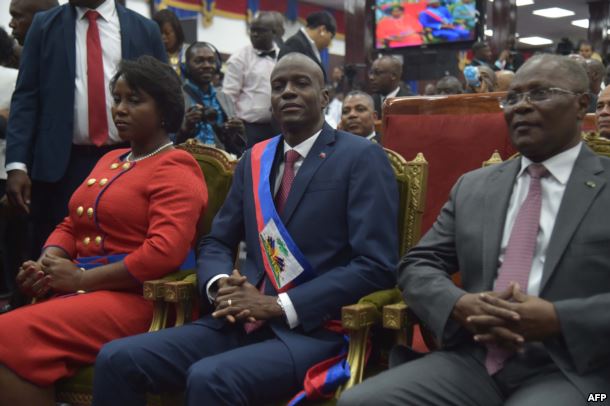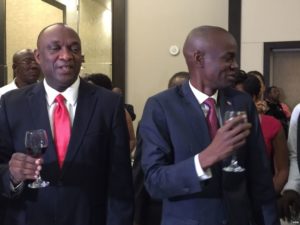
Former auto parts salesman and banana exporter Jovenel Moïse, 48, became Haiti’s 58th president on Feb. 7, 2017, in ceremonies at the Parliament and a miniature model of the former National Palace, which was destroyed in the Jan. 12, 2010 earthquake.
The President of Haiti’s Senate and Parliament’s National Assembly, Sen. Youri Latortue, whom the U.S. Embassy has described as a “Mafia boss,” “drug dealer,” and “poster-boy for political corruption,” draped the ceremonial Presidential sash on his close political confederate, who takes over from interim president Jocelerme Privert.
Indeed, the Parliament is dominated by senators and deputies from Moïse’s Haitian Bald Headed Party (PHTK) and other allied right-wing parties, making the Haitian government look very similar to that of the U.S. where another politically inexperienced businessman promising jobs, Donald Trump, won power and has a Republican majority in Congress.
A number of the parliamentarians, including Latortue and Chamber of Deputies President Cholzer Chancy, have well-known criminal backgrounds, including some indictments and convictions. Indeed, one senator-elect – former soldier, police chief, and “rebel” leader Guy Philippe – could not make the ceremonies because he is being held on drug trafficking charges in a Miami jail cell, after having been arrested by Haitian police and turned over to the U.S. Drug Enforcement Agency (DEA) on Jan. 5.
Moïse’s inaugural speech was tightly and professionally written (as one would expect from a candidate who spent $4 million for the expertise of the Madrid-based election-engineering firm Ostos & Sola), hitting all the usual notes.
Saying he wants to “build a country which makes us all proud,” Moïse, like his elected predecessor Michel Martelly, pledged to “reform schools.” But perhaps due to the ribald Martelly’s corruption-tarnished reputation, he also pledged to “engage myself to work for Haiti to regain its dignity.”

He said that “people in the diaspora can return home,” which many are still scared to do. “Haiti has returned to the road of democracy,” he assured, and is “a mine of riches… but the people are in poverty because we don’t work together… We can if we want. It’s our mentality which has to change.”
Using the concrete imagery that helped his campaign especially in the countryside, Moïse declared: “The day has come for us to put the land, rivers, sun, and people together for us to develop our country.”
He also put out a call for unity saying “I will need everyone, all the former candidates, all the people that voted for me, all those who didn’t vote for me, and all those who didn’t vote at all. I need everyone. I need you all so Haiti can rise to meet this great challenge.”
Saying that “I feel a great pride to be Haitian,” he announced that “it is time to put to work what the people voted for last Nov. 20.” But about 80% of Haiti’s 6.2 million electorate did not cast ballots in that election, meaning that Moïse won with only 9.55% of eligible voters, hardly a mandate.
While saying that “the time has come to combine integrity, morality, merit, order, and discipline,” he also declared, with great vehemence, that “never, never, will the justice system and Haitian institutions be used as instruments for political persecution.” This latter declaration may be aimed at the potential multi-million-dollar money-laundering indictment that still hangs over his head. He claims it is the work of political opponents.
He gave the usual presidential inauguration laundry list saying “we will invest in and cultivate available lands, build roads, bridges, and electricity networks… build schools, dispensaries, and hospitals, facilitate great tourist projects, take all the advantage we can from the HELP and HOPE acts [of the U.S. Congress] by promoting investment in the assembly sector.”
In short, the cornerstones of Moïse’s economic program appear to be the same as that of Michel Martelly and former late dictator Jean-Claude Duvalier three decades ago: tourism and sweatshops.
All three presidential runners-up – Jude Célestin, Moïse Jean-Charles, and Maryse Narcisse – refuse to recognize Moïse’s victory, calling it an “electoral coup d’état.” With the record-breaking low turnout, it’s not surprising that Moïse wanted to “give hope to all in a spirit of unity and national concord,” asserting that “I will be the guarantor of a Haiti which is just, equitable, and stable.”
But a 22-page report released a day before the inauguration by the National Lawyers Guild (NLG) and the International Association of Democratic Lawyers (IADL), both election observers, suggest that the road ahead may be rocky for the new president.
“Haiti‘s Unrepresentative Democracy: Exclusion and Discouragement in the Nov. 20, 2016, Elections” lays out the problems surrounding the rise to power of Moïse and Haiti’s right-wing parliament.
“A large (but hard-to-quantify) number of Haitians did not vote on Nov. 20, not because they did not want to, but because they were unable due to difficulties in obtaining electoral cards, registering to vote and finding their names on electoral lists,” the report notes. “Enduring problems with Haiti’s civil registry and the organization responsible for managing it disenfranchised many would-be voters, particularly among the poor and in rural communities. Deficiencies with the civil registry also opened the door to fraud via trafficked identity cards.”
The report also notes how Washington and its allies seem to have contributed to the critical state of Haitian democracy today. “Paradoxically, falling participation rates have occurred alongside massive investments by the international community in Haiti’s electoral apparatus,” the report says. “The millions spent by the U.S. and other Core Group countries [U.S. allies] on democracy promotion programs in the post-Aristide era have produced an electoral system that is weaker, less trusted and more exclusionary than what came before.”
As a result, “[w]hile Haiti may obtain some much-needed political stability in the short term, a president elected by less than 10% of eligible voters faces serious limits to his popular mandate,” the executive summary concludes. “Even more serious questions remain about the democratic credentials of many senators and deputies, who owe their seats more to the violence, disruptions and fraud of the 2015 elections that put them into office than to the will of Haitian voters.”
Overall, the neo-Duvalierist forces which were routed from power by a popular uprising three decades ago have now regained full control of Haiti’s government through controversial elections, which the vast majority of Haitians took no part in and are skeptical of. It is likely that Jovenel Moïse’s honeymoon will be short indeed.









